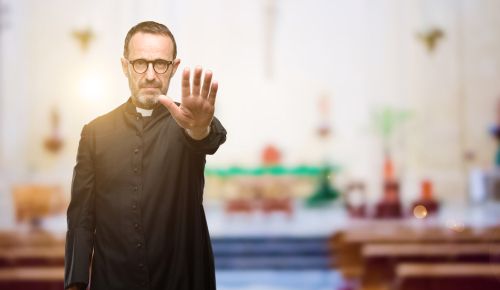 According to a Gallup poll, Americans’ confidence in organized religion is at an all-time low. This news may come as no surprise, as confidence in organized religion has been on the decline for several decades now. Whereas in 1975, 68% of Americans claimed to have a great deal of faith in religious institutions, that percentage fell by almost half in 2019. Last year, confidence rates reached an all-time low of 36%.
According to a Gallup poll, Americans’ confidence in organized religion is at an all-time low. This news may come as no surprise, as confidence in organized religion has been on the decline for several decades now. Whereas in 1975, 68% of Americans claimed to have a great deal of faith in religious institutions, that percentage fell by almost half in 2019. Last year, confidence rates reached an all-time low of 36%.
Confidence in religious institutions fell below the majority level for the first time in 2002. Back in 1985, churches and other organizations were the most trusted institutions in the U.S.
Religion Is on Par With the Government, Medical System and Public Schools
Reduced confidence in organized religion is just part of a wide-sweeping trend, which is driven in part by U.S. culture and social norms. Another Gallup study of 15 institutions reveals that trust in most organizations is down; in fact, only three have confidence ratings that soar above the majority level. Those three include military (73%), small business (68%) and law enforcement (53%). Americans’ faith in all other 12 societies is at or near an all-time low.
Faith in the most important establishment — the U.S. government — is also at the lowest it has ever been, with only 11% of Americans expressing confidence in Congress. Thirty-six percent say they have “some” confidence, while 56% say they have little to none.
Americans’ faith in religious organizations is lower than that of their faith in the U.S. presidency (38%, which is saying something) and the U.S. Supreme Court (38%). However, it is greater than its trust in medical institutions (36%), banks (30%) and public schools (29%).
Possible Causes Behind the Growing Distrust of Major Religious Groups
The “why” behind the declining faith in religious institutions is complex and multifaceted. Some speculate that the “bigness” of global churches deters could-be prospects. This theory is backed by the fact that more Americans choose to support small mom-and-pop shops, boutiques and farm-to-table eateries over big brands and chain restaurants.
Another trend that supports the “bigness” theory is the growth in non-denominational religious entities. Non-denominational churches are growing at a faster rate than any other religious institution, which is telling of Americans’ desire for more intimate connections. It also suggests that individuals who involve themselves with ad hoc institutions are less likely to put their faith in organized religion.
In addition to these generalized considerations, there are a few more specific ones that may have directly swayed Americans’ opinions of organized religion. Those are as follows:
- In recent years, reports of sexual harassment and abuse came to light regarding leaders of the Southern Baptist church.
- Catholic priests have been under fire for decades now for sexual abuse and molestation. In 2002, the Boston Globe created an award-winning series that unveiled the extensive history of abuse, which the Catholic hierarchy had routinely covered up.
- The United Methodist Church has routinely made headlines in the past decade or so for its hate-filled preaching and gross intolerance, including intolerance toward same-sex marriage and LGBT clergy members. In today’s generation, intolerance of any kind is almost an automatic turnoff.
- More recently, the pastor of the Riverside Church in Manhattan was fired in light of sexual harassment allegations and reportedly having visited lewd sex shops during religious conference trips.
Though not a direct influencer, religion’s relationship to politics may not bode well in its favor. While there is no rule about what political stance a believer must take or vice versa, it is well known that self-proclaimed conservatives also happen to be affiliated with the Protestant church. Moreover, President Trump and his oftentimes controversial beliefs enjoy highly visible support from prominent evangelical leaders.
Confidence in religious institutions in American has taken a hit as more turn away from organized religion. A number of factors are at play, but it is likely this is a trend that will continue.



